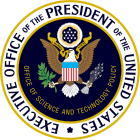 | |
| Agency overview | |
|---|---|
| Formed | May 11, 1976 |
| Preceding agency |
|
| Headquarters | Eisenhower Executive Office Building 725 17th Street NW, Washington, D.C., U.S. |
| Employees | 45 |
| Agency executives |
|
| Parent agency | Executive Office of the President |
| Website | WhiteHouse.gov/OSTP |
The Office of Science and Technology Policy (OSTP) is a department of the United States government, part of the Executive Office of the President (EOP), established by United States Congress on May 11, 1976, with a broad mandate to advise the President on the effects of science and technology on domestic and international affairs.
The director of this office is colloquially known as the President's Science Advisor. In January 2019, meteorologist Kelvin Droegemeier was confirmed to the position,[1] after almost two years of the position being vacant.[2]
History
President Richard M. Nixon eliminated the President's Science Advisory Committee after his second Science Advisor, Edward E. David Jr., resigned in 1973, rather than appointing a replacement. The United States Congress then established the OSTP in 1976 with a broad mandate to advise the President and others within the Executive Office of the President on the effects of science and technology on domestic and international affairs. The 1976 Act also authorizes OSTP to lead inter-agency efforts to develop and to implement sound science and technology policies and budgets and to work with the private sector, state and local governments, the science and higher education communities, and other nations toward this end.
Under President Donald Trump, OSTP's staff dropped from 135 to 45 people.[3] The OSTP director position remained vacant for over two years, the longest vacancy for the position since the office's founding.[4][5][1] Kelvin Droegemeier, an atmospheric scientist who previously served as the vice president of research at the University of Oklahoma, was nominated for the position on August 1, 2018[6] and confirmed by the Senate on January 2, 2019. Michael Kratsios was nominated by President Trump to be the fourth Chief Technology Officer of the United States and Associate Director of OSTP in March 2019[7] and was unanimously confirmed by the Senate on August 1, 2019.[8]
President Joe Biden named Eric Lander head of the Office of Science and Technology Policy, which will become a cabinet-level post.[9]
Public facing key staff
Key positions vary among administrations and are not always published online. [10]
- Director for the Office of Science and Technology Policy: Kelvin Droegemeier [11]
- Chief Technology Officer of the United States: Michael Kratsios[8][12]
Directors
| No. | Portrait | Name | President | Term |
|---|---|---|---|---|
| 1 |  | H. Guyford Stever | Gerald Ford | 1976–1977 |
| 2 |  | Frank Press | Jimmy Carter | 1977–1981 |
| Benjamin Huberman (acting) | Ronald Reagan | 1981 | ||
| 3 |  | George A. Keyworth, II | 1981–1985 | |
| John P. McTague (acting) | 1986 | |||
| Richard G. Johnson (acting) | 1986 | |||
| 4 |  | William Robert Graham | 1986–1989 | |
| Thomas P. Rona (acting) | 1989 | |||
| William G. Wells (acting) | George H. W. Bush | 1989 | ||
| 5 | D. Allan Bromley | 1989–1993 | ||
| 6 | .jpg) | John H. Gibbons | Bill Clinton | 1993–1998 |
 | Kerri-Ann Jones (acting) | 1998 | ||
| 7 |  | Neal F. Lane | 1998–2001 | |
 | Rosina Bierbaum (acting) | George W. Bush | 2001 | |
| Clifford Gabriel (acting) | 2001 | |||
| 8 |  | John H. Marburger III | 2001–2009 | |
| Ted Wackler (acting) | Barack Obama | 2009 | ||
| 9 |  | John Holdren | 2009–2017 | |
| 10 | .jpg) | Kelvin Droegemeier | Donald Trump | 2019–2021 |
| 11 |  | Eric Lander | Joe Biden | Nominee |
* Italics indicate provisional occupants
See also
- Title 32 of the Code of Federal Regulations
- National Science and Technology Council
- President's Council of Advisors on Science and Technology
- Science Advisor to the President
References
- ^ a b Reardon, Sara; Witze, Alexandra (31 July 2018). "The wait is over: Trump taps meteorologist as White House science adviser". Nature. 560 (7717): 150–151. Bibcode:2018Natur.560..150R. doi:10.1038/d41586-018-05862-y. PMID 30087470.
- ^ Lapowsky, Issie (January 20, 2018). "The lasting impacts of Trump's first year". Wired.
- ^ Alemany, Jacqueline (November 21, 2017). "Donald Trump's science office is a ghost town". CBS.
- ^ Morello, Lauren (24 October 2017). "Wait for Trump's science adviser breaks modern-era record". Nature. doi:10.1038/nature.2017.22878.
- ^ Aldhouse, Peter (January 18, 2017). "Trump's war on science isn't what you think". CBS.
- ^ Irfan, Umair (August 1, 2018). "Trump finally picked a science adviser. He's a meteorologist. Named Kelvin". Vox.
- ^ "President Donald J. Trump Announces Intent to Nominate Personnel to a Key Administration Post". The White House. Retrieved 2019-08-05.
- ^ a b Chappellet-Lanier, Tajha (August 1, 2019). "Michael Kratsios confirmed as US CTO". Fedscoop. Retrieved August 4, 2019.
- ^ "Biden elevates science post to level". msn.com. Yahoo News. AFP. January 15, 2021. Retrieved January 15, 2021.
- ^ "Staff". The White House.
- ^ Musil, Steven. "Trump plans to nominate Michael Kratsios as US CTO". CNET.
- ^ "Michael Kratsios". The White House.
- ^ "Previous Science Advisors (1973–2009)". White House – via National Archives and Records Administration.
_A.jpg)